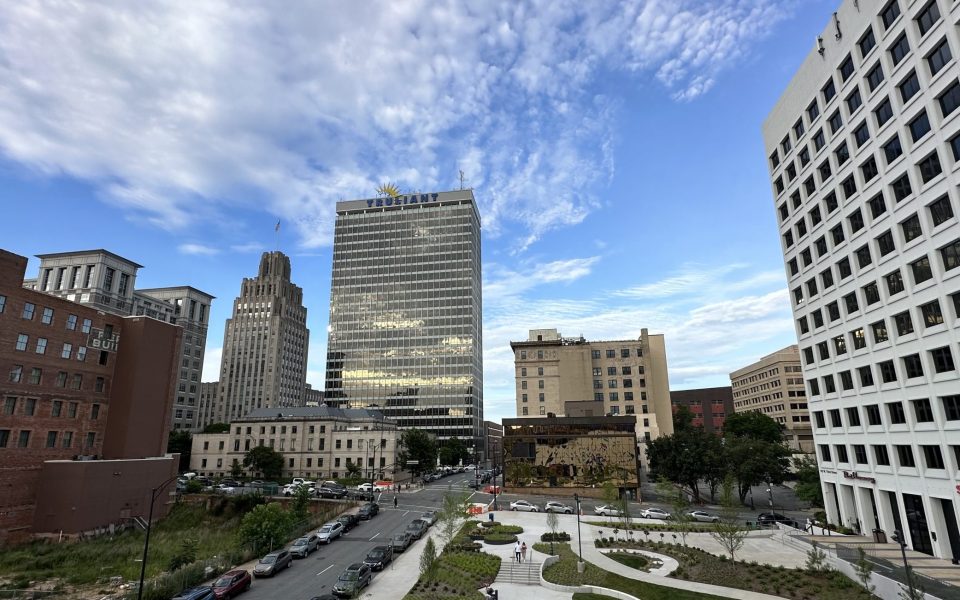Featured photo: A view of downtown Winston-Salem from Kaleideum’s rooftop. (Photo by Gale Melcher)
Winston-Salem and Forsyth County are developing Forward 2045, a new comprehensive plan that will shape the city’s landscape for years to come. And they want residents’ input.
Per State Statute Sec. 160D-501, North Carolina municipalities are required to have a comprehensive plan that is “reasonably maintained as a condition of adopting and applying zoning codes,” according to Forward 2045’s website. The city’s current comprehensive plan, Legacy 2030, was adopted a decade ago. While the plan has been honored with the 2014 Daniel Burnham Award for a Comprehensive Plan and a 2013 National Planning Achievement Award, there have been “economic, cultural and societal changes and trends” since its adoption in 2012 that impact the city’s future, according to Forward 2045’s website, which is why a new plan is being created.
Comprehensive plans outline guidance on the growth and development of the community, including transportation, land use, economic development, downtown and more.
Planning staff gathered information on current trends, community history and demographic data. Then they reached out to the community.
After gathering public input through meetings, surveys and community events, they have drafted a plan, which will be adopted by city and county leadership. Final public input on this draft plan is happening now. The last meeting will be held on Wednesday, Aug. 14 from 5:30-7:30 p.m. at South Fork Community Center at 4403 Country Club Road. Residents can make comments on the plan through Friday, Aug. 16.
The “guiding principles” of Forward 2045 are equity, livability and resiliency. It also has five “themes” that serve as its foundation: Attainable housing and stable neighborhoods, strong economic opportunities, connected and accessible spaces, a vibrant character and identity and a sustainable and healthy environment.
This plan influences and outlines land use — where things are located have a huge impact on the community. To keep things organized, municipalities adhere to specific area plan recommendations and zoning rules. Just because residents own a plot of land doesn’t mean they can do whatever they want with it. Building a restaurant, for example, on land zoned for residential use or small businesses isn’t allowed. But that’s what zoning petitions are for: If you get approval from your local planning board and city to change what that area is zoned for, you can.
As the city grows, making good land use decisions is especially crucial.
Forsyth County’s population grew from 350,670 in 2010 to 382,590 in 2020. According to Forward 2045’s “Managed Growth and Land Use” document, the county faces “unique challenges” due to it being on the small side with 408 square miles of land. It ranks 60th in land area out of North Carolina’s 100 counties, but is the fourth most populous county in the state. “This means we must be more efficient in how we use our land compared to neighboring communities,” the document states.
The last meeting will be held on Wednesday, Aug. 14 from 5:30-7:30 p.m. at South Fork Community Center at 4403 Country Club Road. Residents can make comments on the plan through Friday, Aug. 16
All CityBeat reporting content is made possible by a grant from the NC Local News Lab Fund, available to republish for free by any news outlet who cares to use it. Learn More ↗
Republish this storyJoin the First Amendment Society, a membership that goes directly to funding TCB‘s newsroom.
We believe that reporting can save the world.
The TCB First Amendment Society recognizes the vital role of a free, unfettered press with a bundling of local experiences designed to build community, and unique engagements with our newsroom that will help you understand, and shape, local journalism’s critical role in uplifting the people in our cities.
All revenue goes directly into the newsroom as reporters’ salaries and freelance commissions.


Leave a Reply